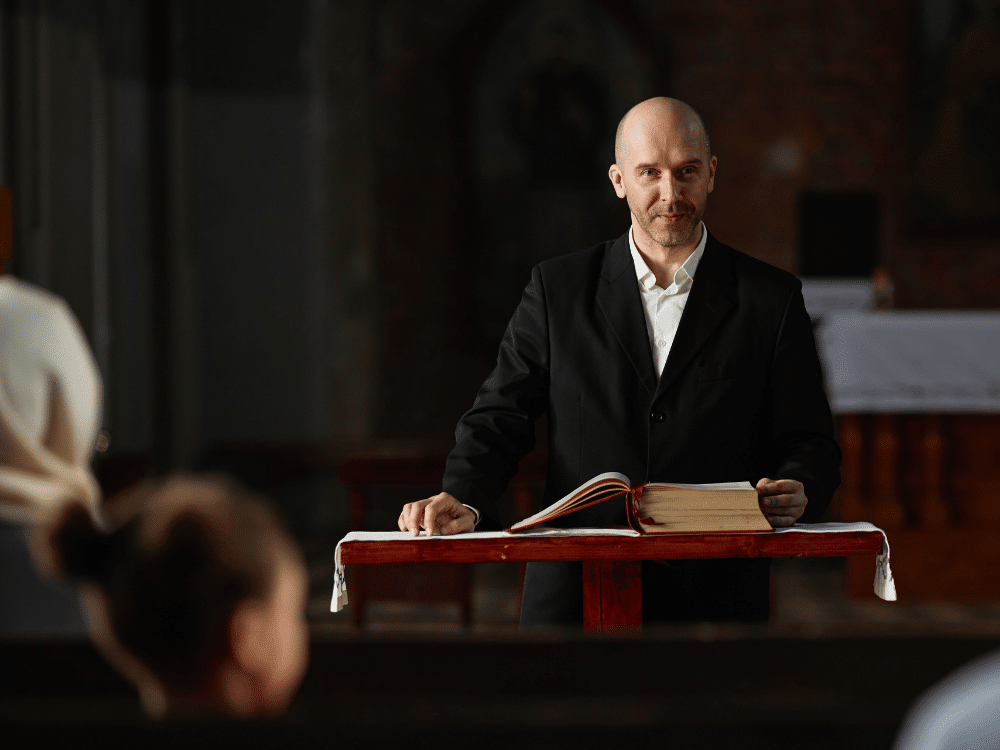Losing a loved one is a difficult experience whether it is expected or not, and in the days and weeks following a death, loved ones often struggle to find the words to express their grief of saying goodbye. This is especially true for those asked to share a reading or eulogize their dearly departed.
A funeral poem is a timeless and tasteful way to convey the emotions you are feeling during this difficult time. By choosing one of the following funeral poems, you can honor your loved one who passed away while also lending support and strength to those who are grieving.
At The Gardens, we understand how difficult and lonely the grieving process can be and how overwhelmed loved ones may be as they try to plan their own memorable and meaningful contributions to the services in order to properly memorialize their deceased friend or family. We’ve taken the time to put together a number of poems to lift the spirits in this difficult time and to share hope and love with those who are also grieving.
6 Uplifting Memorial Poems To Read At A Funeral
The following funeral poems are appropriate for a memorial service or funeral. You could also choose to read one of these poems as part of a eulogy.
“Remember Me” by Christina Rossetti
This poem was written by 19-year-old Christina Rossetti in 1849, and although it was not published for another 13 years has remained popular since — and for good reason.
Remember me when I am gone away,
Gone far away into the silent land;
When you can no more hold me by the hand,
Nor I half turn to go yet turning stay.
Remember me when no more day by day
You tell me of our future that you plann’d:
Only remember me; you understand
It will be late to counsel then or pray.
Yet if you should forget me for a while
And afterwards remember, do not grieve:
For if the darkness and corruption leave
A vestige of the thoughts that once I had,
Better by far you should forget and smile
Than that you should remember and be sad.
In this poem, the writer — and by extension, the loved one reading the poem at a funeral service — expresses a hope to be remembered by their loved one when they are no longer there, and to look back with love at the plans they had made. She does not want those she leave behind to look back in sorrow or grief, and concludes this Victorian sonnet by suggesting that it would be better to forget entirely if her lover is unable to cope with the grief.
“Do Not Stand at My Grave and Weep” by Clare Harner
Although this poem has been incorrectly credited as either an anonymous source or erroneously attributed as a traditional Native American funeral poem, it was actually written by Englishwoman Clare Harner in 1932 and originally published under the title “Immortality” in a poetry magazine. Source aside, the poem is nonetheless a beautiful and appropriate funeral reading, as it reassures the reader that their loved one is not really gone, but rather alive in spirit and watching over them still.
There are a number of versions of the poem in circulation, but the following is the original version:
Do not stand
By my grave, and weep.
I am not there,
I do not sleep—
I am the thousand winds that blow
I am the diamond glints in snow
I am the sunlight on ripened grain,
I am the gentle, autumn rain.
As you awake with morning’s hush,
I am the swift, up-flinging rush
Of quiet birds in circling flight,
I am the day transcending night.
Do not stand
By my grave, and cry—
I am not there,
I did not die.
The speaker in this poem reassures the reader that the loved one they are mourning is not actually gone, but rather still alive in spirit. Even though they are no longer physically present, the speaker insists that they still live on in the hearts and minds of those who loved them. This comforting poem offers some solace and hope to those who are grieving.
“Death Is Nothing At All” by Henry Scott-Holland
This poem was first delivered in a sermon as the body of King Edward VII lay in state at Westminster by Henry Scott-Holland, who was a priest at St. Paul’s Cathedral of London. This is a very popular piece to be read at funerals, and although it was written by a religious man can be used as a secular, uplifting work of poetry for those struggling to come to terms with a significant loss.
Death is nothing at all.
It does not count.
I have only slipped away into the next room.
Nothing has happened.
Everything remains exactly as it was.
I am I, and you are you,
and the old life that we lived so fondly together is untouched, unchanged.
Whatever we were to each other, that we are still.
Call me by the old familiar name.
Speak of me in the easy way which you always used.
Put no difference into your tone.
Wear no forced air of solemnity or sorrow.
Laugh as we always laughed at the little jokes that we enjoyed together.
Play, smile, think of me, pray for me.
Let my name be ever the household word that it always was.
Let it be spoken without an effort, without the ghost of a shadow upon it.
Life means all that it ever meant.
It is the same as it ever was.
There is absolute and unbroken continuity.
What is this death but a negligible accident?
Why should I be out of mind because I am out of sight?
I am but waiting for you, for an interval,
somewhere very near,
just round the corner.
All is well.
Nothing is hurt; nothing is lost.
One brief moment and all will be as it was before.
How we shall laugh at the trouble of parting when we meet again!
“Nothing is hurt; nothing is lost.” This is a wonderful sentiment to close out a poem that goes into depth about how death is really nothing more than a transition from one state to another. It offers hope and reassurance to those who are grieving, and helps them to see that their loved ones are still with them in spirit even though they are no longer physically present.
“Warm Summer Sun” by Mark Twain
As with nearly all of Twain’s celebrated works, this brief yet impactful poem offers beautiful imagery of what makes life beautiful while helping remind us that death is but one small piece of the passing of time as marked by a life, or a day in a life. We are here for but a fleeting time, but can take comfort in knowing our loved one experienced the blowing air, the warmth of the sun, and the radiant green of a field in high summer.
Warm summer sun,
Shine kindly here,
Warm southern wind,
Blow softly here.
Green sod above,
Lie light, lie light.
Good night, dear heart,
Good night, good night.
Warm Summer Sun is a popular choice for a funeral poem for a number of reasons. It is short, so it can be easily recited by those who are grieving. It is also written in simple language that is easy to understand, making it a good choice for funeral poems for children. And finally, it offers a message of hope and reassurance to those who are left behind.
“And Death Shall Have No Dominion” by Dylan Thomas
One of the most renowned poets of the twentieth century, Dylan Thomas was known for his use of language that was at once beautiful and complex, yet also accessible to a wide audience. This poem is no different, as it offers a message of hope and defiance in the face of death. It is a reminder that even though death may take away our physical bodies, it cannot touch our spirits or extinguish the love we have for one another.
And death shall have no dominion.
Dead men naked they shall be one
With the man in the wind and the west moon;
When their bones are picked clean and the clean bones gone,
They shall have stars at elbow and foot;
Though they go mad they shall be sane,
Though they sink through the sea they shall rise again;
Though lovers be lost love shall not;
And death shall have no dominion.
And death shall have no dominion.
Under the windings of the sea
They lying long shall not die windily;
Twisting on racks when sinews give way,
Strapped to a wheel, yet they shall not break;
Faith in their hands shall snap in two,
And the unicorn evils run them through;
Split all ends up they shan’t crack;
And death shall have no dominion.
And death shall have no dominion.
No more may gulls cry at their ears
Or waves break loud on the seashores;
Where blew a flower may a flower no more
Lift its head to the blows of the rain;
Though they be mad and dead as nails,
Heads of the characters hammer through daisies;
Break in the sun till the sun breaks down,
And death shall have no dominion.
This is one of the most famous funeral poems of all time, and for good reason. It is a reminder that even in death, we still live on through our memories and the love we have for one another. It is also a defiant poem that assures us that death cannot break the human spirit or extinguish our capacity for love. There are a number Thomas’ poems that would be equally fitting for a funeral, such as “Do Not Go Gentle Into That Good Night” or “And You, My Father.”
“Because I could not stop for Death” by Emily Dickinson
Emily Dickinson is one of the most celebrated poets in America, and many of her poems now considered classics. This particular poem is a beautiful and chilling look at death, as seen through the eyes of a person who is being taken on a journey by personified Death. It is a reminder that death is not something to be feared, but should be seen as a natural part of life.
Because I could not stop for Death—
He kindly stopped for me—
The Carriage held but just Ourselves—
And Immortality.
We slowly drove—He knew no haste
And I had put away
My labor and my leisure too,
For His Civility—
We passed the School, where Children strove
At Recess—in the Ring—
We passed the Fields of Gazing Grain—
We passed the Setting Sun—
Or rather—He passed us—
The Dews drew quivering and chill—
For only Gossamer, my Gown—
My Tippet—only Tulle—
We paused before a House that seemed
A Swelling of the Ground—
The Roof was scarcely visible—
The Cornice—in the Ground—
Since then—’tis Centuries—and yet
Feels shorter than the Day
I first surmised the Horses’ Heads
Were toward Eternity—
As with may of the poems on this list, Dickinson looks at death as a natural part of life, and one that should not be feared. It also emphasizes the idea that even though our physical bodies may perish, our spirits live on forever. This makes it a perfect funeral poem, as it offers both comfort and hope to those who are grieving.
While reading this poem we can be reminded that although our loved one is no longer physically with us, they will live on in spirit and in our collective memory.
What Are the Most Popular Poems to Read At a Funeral?
Although the poems provided above are some of the most popular funeral poems, there are many other well-known and lesser known works that can be used to provide comfort to those who are grieving. Not every poem is a perfect fit, and some are more appropriate for certain types of funerals than others. But the important thing is to choose a poem that resonates with you and helps you to express the emotions you are feeling.
Some other popular funeral poems include:
- “In Flanders Fields” by John McCrae
- “Funeral Blues” by W.H. Auden
- “She Is Gone” by David Harkins
- “Death is Nothing At All” by Canon Henry Scott Holland
- “A Song of Living” by Vachel Lindsay
- “I am the Resurrection and the Life” by John 11:25-26
- “Do not go gentle into that good night” by Dylan Thomas
- “And You, My Father” by Dylan Thomas
If you are struggling to come up with ideas, there are many resources available that can help you to find the perfect funeral poem. Funeral poems can be found in books of poetry, online, or even in funeral programs. You can also ask family and friends for recommendations. The important thing is to take your time and choose a poem that feels right for you and your situation.
When looking for a funeral poem, it is important to consider the tone and theme of the poem. funeral poems can be sad and mournful, or they can be more uplifting and reassuring. It is also important to consider the appropriateness of the poem for the funeral service. Some poems are more suited for certain types of funerals than others. Choosing an uplifting poem like those mentioned above is always a safe selection so as to not put anyone into further distress with heavy, bleak, or graphic funeral poems.
If your loved one had a favorite poet — or favorite poem — that could be a good place to start when looking for funeral poems. You could also look for funeral poems that are related to your loved one’s hobbies or interests. For example, if your loved one was an avid gardener, you might look for gardening-themed funeral poems.
When it comes to choosing funeral poems, there is no right or wrong answer. The most important thing is to choose a poem that feels right for you and your situation. If you are struggling to make a selection or are unsure of whether or not your poem is appropriate, check with family members. If you are working with The Gardens for an upcoming funeral service, we will be happy to review your poem selection with you.
Contact The Gardens to Get Help Pre-Planning Your Funeral Today
The Gardens at Boca Raton offers funerary pre-planning services that cover all of the many details and costs of this important service, saving your loved ones time, stress, and money.
Oftentimes our clients will select a poem, short story, or song that they would like to leave behind for their funeral service. With this option, you can leave your family and friends with sentimental work to remind them that you will be with them as they go through life in your physical absence. If you are interested in this option, please contact us today. We would be more than happy to assist you in making funeral arrangements that reflect your unique life and personality.


